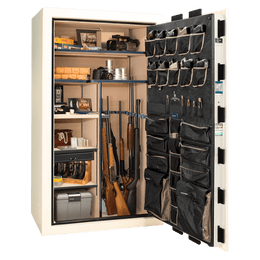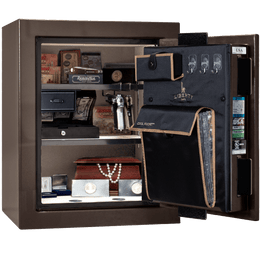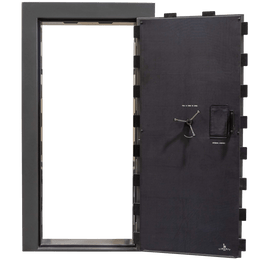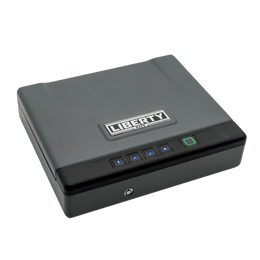In the past few years, the firearms community has gained more new members than in any other period in history. More people are becoming interested in self-defense, hunting, and recreational shooting. And, of course, as a result, more people are buying guns for the first time. The proper, safe, and legal use of firearms requires that you understand some important principles, and we at Liberty Safe are proud to help.
For the purposes of this article, we’re going to assume you already have your first gun. In other words, you have already bought or been given a firearm and are a first-time gun owner (or are re-entering the shooting sports after a long hiatus). But if you haven’t bought your first gun yet and are in the process of preparing to buy your first firearm, we’ll still give you some great tips in the lower portion of this article. For a deeper dive, you can also read our articles on questions to ask when buying a gun and what do I need to buy a gun.
So, for first-time gun owners, let’s review a few key points and tips that can make things go smoothly as you enter the exciting and fun world of firearms ownership.
Table of Contents
- First and most importantly, Learn and follow the four rules of firearm safety.
- Read and understand your firearm’s owner’s manual.
- Learn and follow your local gun laws.
- Practice regularly with your firearm.
- If you plan to carry concealed (CCW), learn the basic modes of carry (and your local carry laws).
- Secure your firearm when not in use.
- Identify your reasons for wanting to purchase a gun.
- Secure any state or local documentation or firearms permits (where required).
- Going to the gun store.
Please note: This article is intended for informational purposes only. You are responsible for researching the legal and safe use of firearms in your jurisdiction. Neither Liberty Safe nor the author assumes any liability for the use or misuse of this information.
First and most importantly, Learn and follow the four rules of firearm safety
These rules are important for anyone who owns or uses firearms, but for new gun owners, it’s especially important to learn and practice the four rules of gun safety. We’ve all heard stories of accidental shootings where the gun just went off, or the person didn’t know it was loaded. In 100% of these cases, proper knowledge of safe gun handling would have prevented these tragedies. There are lots of different ways to elaborate the four basic gun safety rules, but in general, these are the key points:
- Treat all guns as if they’re loaded unless you personally, immediately, and visually verify otherwise. Another way to put this is all guns are always loaded.
- Never allow the muzzle/barrel of any gun to point at anything you are not willing to shoot and destroy. This includes the shooter’s legs, feet, hands, other people, etc.
- Keep your finger off the trigger and outside the trigger guard until your sights are on the target and you are ready to shoot. Many new gun owners automatically place their fingers on the trigger when picking up a gun. Get out of this habit immediately.
- Be sure of your target and what is behind it. For example, don’t shoot at a target on the crest of a hill, as you have no idea where that bullet will go.
If you’re a new gun owner handling your unloaded gun at home, practice good trigger discipline and muzzle awareness. Never point your gun at yourself, your pets, or anyone else who isn’t trying to harm you, even though you’re sure the gun isn’t loaded. Our handy Gun Owner’s Glossary can be very useful if you are unfamiliar with any firearms-related terms.
Read and understand your firearm’s owner’s manual (gain accurate knowledge of how to operate your firearm safely)
First-time gun owners (and everyone else using and handling guns) need to read and understand the owner’s manual for each specific firearm. There are many different types and styles of guns. There are often important differences in operation between different sub-variants of the same brand and type of firearm. Be sure to learn how your specific firearm works and how to handle, load, unload, and operate it safely. The best source for this information is the factory owner’s manual.
If you obtain a new firearm from a local gun store or online dealer, it will usually come with the factory packaging and the owner’s manual. If you bought or were given a used gun from a private individual (where legal) or from a dealer, an owner’s manual may or may not be included. However, every reputable firearms manufacturer will gladly provide an owner’s manual free of charge upon request, and most make their catalog of manuals available online.
It’s vital that you become familiar with your specificfirearm’s features, controls, and functions. Even if you think you know how it works, or if you used to have guns decades ago and are just getting back into it, it’s important that you research your specific firearm model. Updated safety features, multi-function controls, and specific disassembly and reassembly procedures may apply to your gun.
If you are a first-time gun owner and aren’t exactly sure how your firearm works, please don’t handle it much, and in particular, don’t load it until you fully understand how to handle and operate it safely. A gun you don’t know how to operate is potentially more dangerous to you and your family than it is to any threat you may face.
Learn and follow your local gun laws
This is an area that can be tricky for new gun owners. Some people assume that since they obtained the gun in a particular area, that it’s still legal to own and carry in that jurisdiction. Or maybe they may have purchased or obtained items like magazines or certain types of ammunition along with their firearm, which may or may not be legal to possess under current regulations. Firearms laws vary GREATLY between states and can even differ between counties or cities within the same state. Read up as much as you can on your local firearms laws and ordinances.
There may be prohibitions on the type or even the specific model of firearm you own. There may also be recent laws enacted that restrict the possession or transfer/sale of certain types of firearm magazines or accessories. Several local governments have recently enacted firearms storage laws, which state certain conditions you must agree to if you want to possess firearms legally in that locality. It is your responsibility to learn and follow all local laws and regulations regarding firearms use and storage. You could potentially be prosecuted for breaking the law, and ignorance of the law is never a valid excuse.
You may also be interested in: What you need to know before flying with a gun.
Practice regularly with your firearm
When you get a driver’s license, you must practice a lot to develop proficiency in driving safely. When you use a power tool or a chainsaw, you must learn the proper handling and safety practices and develop the proper skill to use them safely. Similarly, when you have a gun, developing and maintaining safe handling skills and shooting proficiency is important. Shooting is a perishable skill.
One of the best ways to build and maintain proficiency with your newly acquired firearm is to go to a local gun range regularly. Whether an informal outdoor range or a strictly monitored indoor range, you can still practice safe gun handling skills and develop your shooting abilities. You can practice loading and unloading your gun. You can practice proper sight picture, sight alignment, and trigger control. You can practice dry-firing, which is practicing using the trigger and sights of your gun without loading any ammunition. And you can practice live-fire with quality ammunition.
Even if you’re on a tight budget, you should save to purchase enough ammunition to keep your skills fresh. Even one box of ammunition a month can go a long way. If you want to shoot more often and spend less, consider learning how to reload your own ammo. You can save a lot of money and make better-quality ammunition at the same time.
If you plan to carry concealed (CCW), learn the basic modes of carry (and your local carry laws)
While many new gun owners have bought guns to hunt or target shoot, lots of new gun owners buy firearms with the intent to use them for home defense and/or concealed carry (for personal defense). If you plan to carry concealed, it’s extra important to become very familiar with your local laws about carrying a firearm in a vehicle, and where concealed carry of a weapon (CCW) may be prohibited in your state or city. Our articles on Concealed Carry 101, Best Concealed Carry Holsters, and How to Create Good Concealed Carry Habits can be a big help, also.
Secure your firearm when not in use
This should be a no-brainer, but it’s important to keep your gun (and maybe eventually a larger gun collection) secure and safe from unauthorized access, theft, and damage when not in use. A quality handgun vault or basic gun safe is a great investment and can be surprisingly affordable. As noted above, in some jurisdictions you can be held liable and even criminally charged if you fail to store firearms and ammunition properly.
Regardless of local ordinances, keeping guns and ammunition properly locked up is just a good idea. A properly dehumidified safe can also prevent corrosion, rust, wood cracking, and other environmental damage to firearms, ammunition, other valuables, and even important documents.
So, those are our basic tips for first-time gun owners who have already obtained a gun. If you’re still on the fence or researching before buying your first firearm, keep reading!
Identify your reasons for wanting to purchase a gun
Before going to the gun store to purchase your first gun, you should already have a pretty good idea of what type of firearm you want to purchase. The type of gun you select depends greatly on your intended uses. You may have more than one reason for wanting to buy a gun, like:
- Protecting your home and family
- Self defense
- Hunting
- Target shooting at an indoor or outdoor range
- Skeet or trap shooting
- Starting a gun collection as a hobby or investment
- Participating in shooting competitions
- Other lawful purposes
Once you’ve identified one or more reasons for owning a gun, research the best types of firearms for your intended uses and maybe look into some reviews on specific models.
Our articles on The Best Home Defense Firearm and Understanding Different Firearm Trigger Types and Actions can be very helpful here.
Secure any state or local documentation or firearms permits (where required)
Ideally, before you obtain your first firearm, you should get any necessary permits or documentation needed in your jurisdiction for the legal possession and ownership of your firearm. Your local gun dealer can often be very helpful in determining what paperwork or permits you might need for certain types of firearms.
However, even if you are given a firearm by a family member or friend (which is usually permitted in most jurisdictions, as long as you follow federal and local laws) or if you buy your gun from a private legal seller, you may still be required to obtain the proper documentation, depending on where you live. In most states, non-prohibited persons (non-felons, in simple terms) of legal age can purchase firearms (or be gifted guns) from private individuals without any paperwork. However, some states still require you to notify local authorities or apply for a purchase or possession permit. In some areas, you may need a law enforcement permit to have a firearm in your home legally, so check your local laws carefully.
Going to the gun store
Once you have a good idea of what type of gun you want to buy and have some idea of what is permitted in your state and local jurisdiction, you are ready to go gun shopping. However, you may still have a few questions. Don’t be afraid to ask questions at the gun shop. Most good gun dealers hire experienced, knowledgeable employees who should be happy to answer any questions you might still have as a first-time gun buyer. If they do not want to be bothered with questions, take your business elsewhere. There are plenty of shops that would love to have your business.
Ask questions about the different guns you may be interested in. Don’t forget to ask what the pros and cons are of each and what permits you may need to apply for, if any. Remember, you don’t have to buy your gun at the first shop you go to. You can shop around to see if you can find a better price. However, consider giving them your business if you like the shop and the service.
Try before you buy, if possible
You wouldn’t buy a car without test driving it first, right? The same is true for buying your first gun. If you can rent one and try it out at a shooting range, that’s ideal. Many gun ranges also sell guns, and keep a good stock of rental guns for clients to try out. But at a minimum, you should at least go through a few steps to determine whether the gun you are considering is right for you.
- See how the gun feels in your hand.
- Compare the way the gun feels to other guns
- Is the gun too light or heavy in your hand?
- Grasp the gun firmly around its grip
- Keep your finger off the trigger and outside the trigger guard
- See if you can easily maneuver the gun’s safety (if present) on and off
- See if you can operate it and perform all functions safely (ask the counter assistant for help if needed)
You want to make sure that the gun is not too heavy or too big for you to handle because you could have problems operating it safely. You also want to be able to quickly turn the safety off and on (if present) so that you do not waste time if you need to take a shot fast. You need to know how to open the action, remove the magazine (if applicable), and otherwise operate the firearm safely and effectively. If something doesn’t feel right, or if you don’t like a certain aspect of a firearm, don’t buy it. Don’t feel any pressure to purchase a gun right now. Try some more, or try another gun shop. You don’t want to regret your purchase.
What documentation will you need to purchase a firearm?
Now that we have reviewed some of the key issues to address before purchasing your first firearm let’s discuss what you will need to actually buy it. In almost every state, you must provide a valid photo ID, such as your driver’s license or a current government-issued ID card, like a military ID. You will also need to provide proof of current residence. A phone or utility bill with your correct, current address is often sufficient, but ask your dealer for sure.
Do I need a background check?
In all states, when purchasing a gun from a Federal Firearms Licensed dealer (FFL), you must fill out and sign an ATF Form 4473 Firearms Transaction Form. This form is where you will attest that you are legally eligible to purchase a gun, and you are required by law to fill it out truthfully. Why? Because not only is the gun dealer going to review your information, but they are also required to submit your information to the FBI to be run through its three databases to perform a background check. Some dealers may run your background check on the spot and receive an immediate response. The FBI may approve the sale, deny the sale, or delay the sale.
In some circumstances, the FBI may delay a yes or no because it needs additional information to make a final determination. The FBI then enlists the help of its Criminal Justice Information Services Division, who will have an examiner contact local law enforcement and other agencies to find that additional information. If the FBI does not issue a decision within three days, this is called a default proceed, and the licensed dealer may sell the firearm to the applicant.
After the ATF 4473 form has been approved, you have 30 days to finalize your firearm purchase. If you do not complete your purchase during that time, you must file another form and start over. An approved form can only be used once, for one transaction. If you want to purchase another firearm after your first purchase, even within those 30 days, you must file another form.
Note that in some jurisdictions, you are now required to complete a background check for private firearms sales between individuals as well. Your local gun shops and state government websites will likely have helpful information on completing that process.
We hope you found this article helpful and that you enjoy many years of safe, fun participation in shooting sports!
*Made in the U.S.A. from U.S. and Global Parts.







